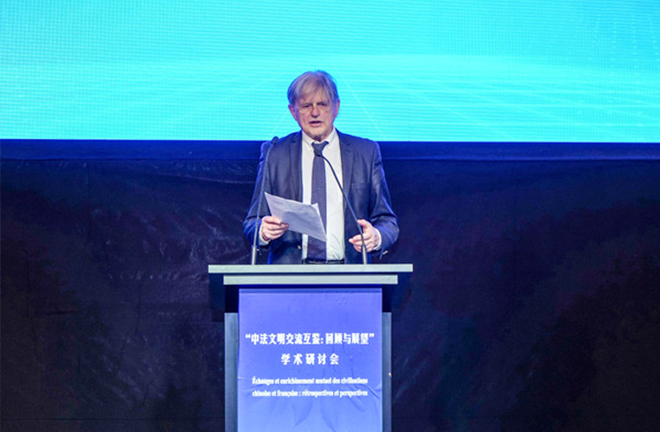Alain le Pichon: Promoter of intercultural understanding

Alain le Pichon Photo: BUREAU OF INTERNATIONAL COOPERATION at CASS
Alain le Pichon is a renowned French anthropologist and the founding president of the International TRANSCULTURA Institute.Born into a prominent French noble family in 1942, he diverged from the familial tradition of political and military careers to pursue an academic vocation.
In the 1970s, he became acquainted with Italian semiotician Umberto Eco and embarked on a career in intercultural studies. In their opinion, it is both necessary and possible to overcome existing cultural barriers, biases, arrogance, and ignorance to form an “intercultural” perspective, and thus they advocated for “looking to the East.” From this intercultural perspective, Professor le Pichon has proposed the concept of reciprocal anthropology in the belief that the world needs more anthropologists who travel between the Western and non-Western worlds. He has called on anthropologists in the “Third World” to write ethnographies about the West, which would allow non-Westerners to examine the West from an alternate perspective.
Back in the 1980s, Professor le Pichon faced unjust treatment due to his involvement in encouraging and aiding African anthropologists in their research on France. He paid a high price for his dedication to intercultural studies, losing his academic titles, his support from the French academic community, and his right to publish. Nevertheless, with a group of insightful scholars standing firmly behind him, he has persevered in his commitment to reciprocal anthropology to this day. By the late 1980s, he found solidarity within the Chinese academic community and initiated ongoing, deepening academic exchanges and cooperation with Chinese scholars.
Cooperation between China and France has been enduring and fruitful. In 1987, Professor le Pichon came to Sun Yat-sen University and began nearly 40 years of exchange and cooperation with the Chinese academic community. He collaborated extensively with renowned scholars Professor Tang Yijie and his wife, Professor Yue Daiyun from Peking University, co-founding a journal titled “Dialogue Transculturel” with Professor Yue Daiyun. Since the 1990s, he has engaged in consistent collaboration with Chinese scholars such as Zhao Tingyang, Wang Mingming, and Huang Ping. In 2019, The Shadow of Monotheism, a collection of correspondences between Professor le Pichon and Zhao Tingyang, were published in both Chinese and French. Professor le Pichon’s academic endeavors have far exceeded the scope of China-France bilateral relations and China-Europe relations in the narrow sense.
In the 1980s, Professor le Pichon and Umberto Eco, both leading figures in intercultural studies, co-founded the International TRANSCULTURA Institute in France. He realized that engagement and cooperation with the Chinese academic community played an essential role in facilitating cultural exchanges and mutual learning between China and France.
In the second decade of the 21st century, Professor le Pichon collaborated with Chinese scholars in organizing four EU-China High Level Cultural Forums. The first forum was held in 2010 in Brussels, seat of the European Commission, with the distinguished presence of the then Chinese Premier and the then-President of the European Commission delivering speeches. Subsequent forums were held in 2011 in the Palace Museum in Beijing, in 2012 in the Louvre in Paris, and in 2014 at Beijing Yanqi Lake International Convention & Exhibition Center, where the 22nd APEC Ministerial Meeting was held.
Effectively facilitated by Professor le Pichon and scholars from the Chinese Academy of Social Sciences such as Zhao Tingyang and Huang Ping, the compilation of the Euro-Chinese Dictionary of Cultural Misunderstandings was recently launched. This specific project of intercultural studies was carried out on a purely voluntary basis. At present, the first volume of the English version of this dictionary has been published. It comprises 34 entries, each with an article from the “Chinese perspective” written by a Chinese scholar, an article from the “European perspective” written by a European scholar, and a “dialogue and summary” co-authored by the two scholars based on their discussion. The authors adopt a historical and academic approach to trace the referential relations between a term listed in the dictionary and a specific concept within their own cultural traditions, as well as the evolution of such relations. In an attempt to engage in a dialogue with the other perspective within a common framework for understanding, the authors have explored the meanings, mistranslations, and misinterpretations of several key concepts in philosophy and social sciences within the China-Europe intercultural context.
At a seminar themed “Exchanges and Mutual Learning Between Chinese and French Civilizations” held on May 3, 2024, Professor le Pichon shared his insights into intercultural studies, his own academic experiences, and the history of his engagement and cooperation with the Chinese academic community. He also stepped down from the podium to present the Euro-Chinese Dictionary of Cultural Misunderstandings to the audience. Professor le Pichon noted that intercultural studies is his lifelong career and an important channel for promoting cultural exchanges and dialogue between China and Europe.
Edited by ZHAO YUAN
